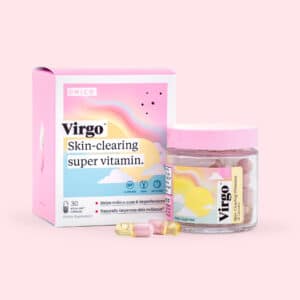Specialty face scrubs. Masks. Toners. Serums. You’ve got all the skincare things. But did you know that antioxidants are also crucial for your skin health?

Don’t get me wrong, I love a fun facial mask as much as the next gal, but today we’re going to look at a less-obvious tool in your skincare arsenal – and also one that can make the biggest impact!
Anti-What?
Antioxidants have become super popular as of late. They seem to be in everything from smoothies to shampoos.
But do they really do anything for you, or are they just a buzzy marketing word?
Don’t worry, we’ll cover all of that. (Although here’s a spoiler alert – they are much, much more than a fancy-sounding word!)
Table of contents
So without further ado – here is your ultimate guide for antioxidants in skincare – including how to pack more into your daily routine.
Now. Before we dig into the antioxidants and how they can help, let’s take a minute to remind ourselves why our skin is so worth keeping healthy!
Reminder- Why Your Skin Matters
Our skin is so, SO important. And not just because it helps us look good!
Our skin is an essential organ with the primary role of keeping our body healthy and safe1.
It has both internal, and external benefits.
Externally, the skin barrier – the outermost layer of your skin – is literally a barrier which is responsible for protecting us from environmental pathogens and toxic agents.
Internally, your skin talks with other body systems that influence the health of your skin. And vice versa.
These are 3 essential roles that your skin plays:
1. Protects Against Environmental Invaders
Think of your skin as the ‘first line of defense’ for your entire body.
It actually plays a crucial role in your immune system.
As a primary defensive mechanism, your skin protects against toxins, allergens, and other bacteria from sneaking inside your body and making you sick.
2. Regulates Most Body Systems
Your skin keeps in constant communication with all of your body systems.
From the brain to the digestive system, these connections allow the skin to maintain the balance of internal functions within your body, including:
- Thermoregulation
- Hormone regulation
- Muscle response and movement
3. Produces Essential Vitamins
“Go outside and get some Vitamin D!”
Most of us have heard this before, and it’s not just a myth!
There’s a real connection between humans, vitamin D, and sunlight.
It works by sunlight stimulating your skin, and literally signaling for it to produce vitamin D.
Your body then absorbs this vitamin to use in several bodily functions, like calcium absorption and muscle function.
As you can see, your skin plays a critical role in keeping you healthy.
And when it is damaged and stressed, your overall health is in jeopardy!
Signs and Sources of Damaged Skin
There are five main signs of damaged, or ‘stressed’ skin.
‘Damaged skin’ refers typically to damage caused to the skin barrier.
The skin barrier may be the most crucial layer of the skin, providing immune protection and homeostasis.
Do any of these signs of damaged skin look familiar?
- Dull or uneven appearance
- Dark spots and hyperpigmentation
- Excess redness and inflammation
- Frequent breakouts
- Feelings of dullness and sensitivity
If so, your skincare routine is just not doing enough to protect your skin from internal and external stress.
These external stressors can range from:
- Excessive UV ray exposure
- Over-exposure to environmental allergens and pollutants
- Skin-damaging hygiene habits (i.e., over-exfoliation, using alkaline soaps)
- High stress and anxiety
- Poor digestion or gut microbiome health
- Genetic skin conditions (i.e., atopic dermatitis, psoriasis)
As you can see, unfortunately there are many things in our daily lives that threaten our skin health.
The good news is, the majority of this damage is repairable (or preventable!) by adding antioxidants into our skincare routine.
Enter Antioxidants: Your Skin’s New Best Friend(s).
Most of us benefit from antioxidants without even knowing it.
Antioxidants occur naturally in many of the foods that we eat, and our bodies are using those nutrients automatically as part of our normal digestive process.
There are tons of benefits that antioxidants have for your skin, and plenty of antioxidant-rich foods that can help you get more of them naturally!
Before we share them…let’s find out what are antioxidants, anyways?
What are Antioxidants, and How Do They Improve Skin Health?
If you are experiencing the symptoms of damaged skin outlined above, it’s time to look into antioxidants.
Antioxidants are micronutrients, macronutrients, or phytonutrients that fight against damage caused by free radicals2.
These free radicals cause damage in the form of oxidative stress, which can alter your cellular DNA and cause extensive damage to your skin barrier.
You can be exposed to free radicals in your environment via pollution or excess sun exposure. Your body also produces them.
It’s virtually impossible to completely avoid these damaging particles, so using oxidation-fighting antioxidants is a must.
The 5 Key Benefits of Antioxidants for Your Skin
1. Reducing Inflammation – Inflammation is a natural immune response that protects us from poor health.
Unfortunately, excessive free radical exposure – especially those caused by UV rays – can cause chronic inflammation, redness, and skin damage.
Antioxidants are natural anti-inflammatories and help calm the immune system, allowing your skin to de-puff.
2. Speedy skin damage repair – Antioxidants promote barrier strength and repair visible skin damage by increasing skin cell turnover, allowing you to see results faster.
3. Preventing Acne & Breakouts – Certain B-vitamins can boost collagen production while fighting breakouts.
4. Blessing you with a brighter glow – Having a brighter ‘glow’ to your skin is related to antioxidants improving skin cell turnover.
Turnover replaces the dead skin cells on your face with bright new ones.
This function also repairs the skin, helping it to maintain balance and retain hydration for a fresh glow.
5. Preventing Premature Aging – A restored and fortified skin barrier can prevent signs of aging. I’m here for reducing wrinkles, tightening the skin, limiting breakouts, and evening skin tone.
But Wait, There’s More (Benefits!)
By adding antioxidant-rich foods for your skin, you’ll also be building your holistic health from the inside out.
That’s because not only are antioxidants crucial for preventing damage at the skin level – they also fight free radical damage that occurs in other areas of the body.
Antioxidants protect and nourish your brain, gut, heart, muscles, immune system, and almost every other part of your body.
The easiest way to ensure you’re getting your fill of daily antioxidants is to have a diverse diet filled with colorful foods and healthy, nutrient-dense vegetables.
Foods with high levels of naturally-occurring antioxidants are2:
- Brightly colored fruits
- Dark, leafy green vegetables
- Acidic foods
- Lean or plant-based proteins
- Fermented foods
Tip: Consider a quality greens supplement to help fill in nutritional gaps and add extra dietary antioxidants
These healthy foods are rich in one or more of the 7 key antioxidants that have the most positive impact on your skin health.
7 Antioxidant Nutrients that Will Transform Your Skin
There are an array of antioxidant nutrients within the rainbow of delicious foods that you should consider adding to your daily diet.
These are the 7 most potent antioxidants for repairing skin barrier damage and boosting your natural glow:
1. Vitamin A
Also known as “retinol” in the world of skincare, vitamin A has a TON of research showing its ability to nourish the skin.
It boosts collagen production at a deeper level, and wards off signs of aging.
2. B Vitamins
The B Vitamins, niacinamide, biotin, and folic acid/folate all promote cell turnover.
Frequent removal of dead skin cells reduces fine lines and wrinkles and hyperpigmentation, inflammation, and breakouts.
3. Vitamin C
Found in citrus fruits and berries, vitamin C is one of the most popular antioxidants out there!
It’s a free radical scavenger, boosts collagen production, and fades dark spots.
4. Vitamin D
Vitamin D is a lesser-known antioxidant in skincare, but that doesn’t make it any less critical for skin health.
This essential vitamin protects individuals skin cells from oxidative damage and has proven to be an effective anti-inflammatory.
5. Zinc
The mineral zinc is also an anti-inflammatory antioxidant for your skin and actively protects you from skin damage14.
Foods that contain plenty of zinc are15:
- Shellfish
- Beans
- Nuts
- Dairy products
- Whole grains
6. Selenium
Selenium works with vitamin C to repair skin and improve overall skin strength.
It can also help prevent skin aging. You can find this antioxidant nutrient by eating more lean and plant-based proteins.
7. Phytonutrients
Phytonutrients fight inflammation, oxidative stress, wrinkling, and damage to cellular structure and DNA.
Some of the most effective phytonutrients are:
- Vitamin E
- Most flavonoids
- Carotenoids (i.e., β-carotene, lycopene, and lutein)
8. Bonus – Nutrients that enhance antioxidant capacity
Some nutrients can boost the effectiveness of antioxidants.
The most common are omega-3 fatty acids and the mineral chromium20.
Add Antioxidants to Your Skincare Routine Today
If antioxidants are missing from your skincare routine, add them by eating more of the foods from the list above.
When experiencing tell-tale signs of skin barrier damage, these nutrients can help repair and restore your natural glow.
Antioxidants also provide more than just better-looking skin- they can significantly improve your overall health.
That being said, you should prioritize healing your skin from within by focusing on antioxidant-rich foods or a high-quality antioxidant supplement.
Topical Antioxidants vs. Ingestible Antioxidants
You may think antioxidants only exist in the serums and creams you apply after a shower. This just is not true.
As outlined above, another way to include antioxidants in your skincare routine is to include them in your daily diet.
But which is better for improving overall antioxidant levels, and protecting your skin?
You may find that ingestible antioxidants, such as those found naturally in foods or supplements, provide a higher level of antioxidants than in creams.
Often times, (but not always!) cosmetics products will include a trace amount of antioxidants in order to include them in their marketing.
Foods or supplements may offer more space per serving to deliver those antioxidants as opposed to a dab of topical cream.
However, the results from topical vs those from foods or supplements may vary from person to person, as each individual has a different body chemistry that can lead to different outcomes.
In conclusion, it’s best to try both and see what works best for you.
Summary:
Skin is a key organ in keeping our bodies safe and healthy.
Antioxidants are essential in repairing damage and preventing new damage.
Compounds with antioxidant power include a range of vitamins, minerals, and phytonutrients.
There are several natural sources of antioxidants, including fruits and vegetables.
Topical and ingestible forms of these nutrients can be effective.
Recommended Reading:
- Does Protein Give You Energy? A Registered Dietitian Says ‘Yes’ - December 12, 2023
- Fast vs. Slow Digesting Proteins – Which is Better? - February 20, 2023
- The Top 7 Benefits of Algae – Meet the Sustainable Superfood of the Future - February 8, 2022

